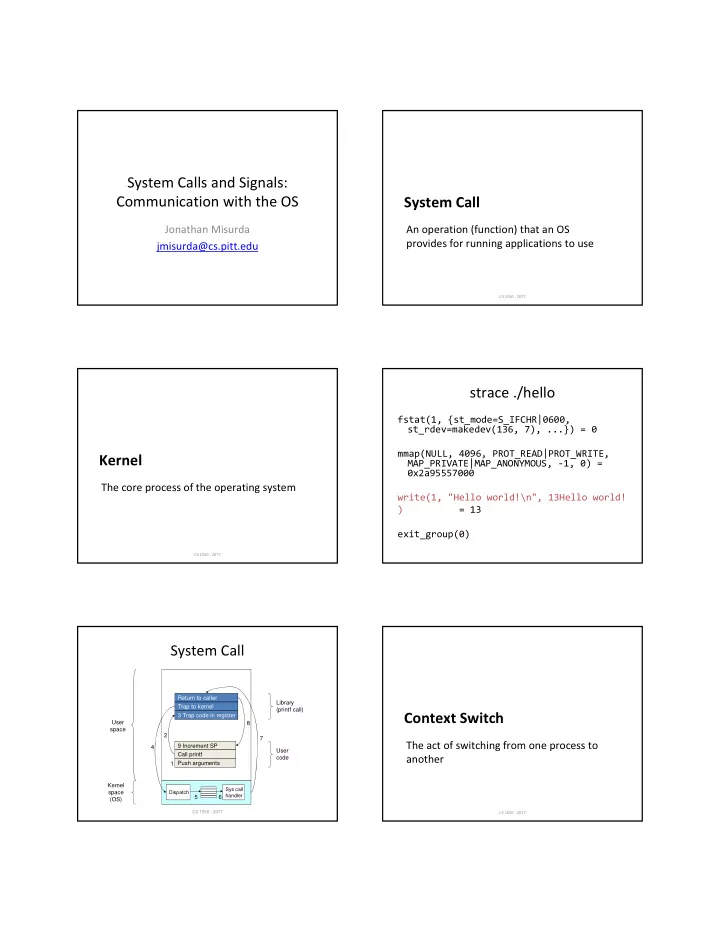

System Calls and Signals: Communication with the OS System Call Jonathan Misurda An operation (function) that an OS provides for running applications to use jmisurda@cs.pitt.edu CS 1550 ‐ 2077 strace ./hello fstat(1, {st_mode=S_IFCHR|0600, st_rdev=makedev(136, 7), ...}) = 0 mmap(NULL, 4096, PROT_READ|PROT_WRITE, Kernel MAP_PRIVATE|MAP_ANONYMOUS, ‐ 1, 0) = 0x2a95557000 The core process of the operating system write(1, "Hello world!\n", 13Hello world! ) = 13 exit_group(0) CS 1550 ‐ 2077 System Call Return to caller Library Trap to kernel (printf call) Context Switch 3 Trap code in register User 8 space 2 7 The act of switching from one process to 9 Increment SP 4 User Call printf code another Push arguments 1 Kernel Sys call space Dispatch handler 5 6 (OS) CS 1550 - 2077 CS 1550 ‐ 2077
Context x86 Privilege Levels • General Purpose Registers • Program counter • CPU status word • Stack pointer • Memory management details Linux Syscalls Using Syscalls #include <stdio.h> • 325 syscall slots reserved (2.6.23.1 kernel) #include <unistd.h> #include <sys/types.h> – Not all are used #include <sys/stat.h> #include <fcntl.h> Syscall Purpose int main() { exit Causes a process to terminate int fd; fork Creates a new process, identical to the current char buffer[100]; one strcpy(buffer, "Hello, World!\n"); read Reads data from a file or device fd = open("hello.txt", O_WRONLY | O_CREAT); write(fd, buffer, strlen(buffer)); write Writes data to a file or device close(fd); open Opens a file exit(0); close Closes a file return 0; creat Creates a file } OR ‐ ing Flags File Descriptors • Integer identifying a unique open file • Define constants as powers of 2 – Similar to FILE * • Bitwise OR to combine • OS maintains additional information about the • Bitwise AND to test file to do things such as clean up on process termination #define O_RDONLY 0 • Three standard file descriptors opened #define O_WRONLY 1 automatically: #define O_RDWR 2 0 – stdin 1 – stdout #define O_CREAT 16 2 – stderr
fork() Fork Example #include <stdio.h> • Creates a new process identical to the calling #include <unistd.h> one int main() { • Return value differs if(fork()==0) { printf("Hi from the child!\n"); – “Child” process return value is 0 } else – “Parent” process gets child’s process id number { printf("Hi from the parent\n"); } printf("Hi from both\n"); • Often used with execv family of functions to return 0; } launch a new program Output Spawning A Program #include <stdio.h> Hi from the child! #include <unistd.h> Hi from both int main() { if(fork()==0) Hi from the parent { char *args[3] = {“ls”, “ ‐ al”, NULL}; Hi from both execvp(args[0], args); } else { int status; wait(&status); printf("Hi from the parent\n"); } return 0; } Signals kill ‐ l • Notifications sent to a program by OS SIGHUP SIGINT SIGQUIT SIGILL SIGTRAP SIGABRT SIGBUS SIGFPE SIGKILL SIGUSR1 – Indicate special events SIGSEGV SIGUSR2 SIGPIPE SIGALRM SIGTERM SIGCHLD SIGCONT SIGSTOP SIGTSTP SIGTTIN SIGTTOU SIGURG SIGXCPU SIGXFSZ SIGVTALRM • Allows for asynchronous notification rather SIGPROF SIGWINCH SIGIO SIGPWR SIGSYS than polling SIGRTMIN SIGRTMIN+1 SIGRTMIN+2 SIGRTMIN+3 SIGRTMIN+4 SIGRTMIN+5 SIGRTMIN+6 SIGRTMIN+7 SIGRTMIN+8 SIGRTMIN+9 SIGRTMIN+10 SIGRTMIN+11 SIGRTMIN+12 SIGRTMIN+13 SIGRTMIN+14 • Polling – to explicitly ask if something SIGRTMIN+15 SIGRTMAX ‐ 14 SIGRTMAX ‐ 13 SIGRTMAX ‐ 12 SIGRTMAX ‐ 11 SIGRTMAX ‐ 10 SIGRTMAX ‐ 9 SIGRTMAX ‐ 8 SIGRTMAX ‐ 7 SIGRTMAX ‐ 6 occurred, usually repeatedly SIGRTMAX ‐ 5 SIGRTMAX ‐ 4 SIGRTMAX ‐ 3 SIGRTMAX ‐ 2 SIGRTMAX ‐ 1 SIGRTMAX
Common Error Signals Termination Signals • SIGILL – Illegal Instruction • SIGINT – Interrupt, or what happens when you hit CTRL + C • SIGBUS – Bus Error, usually caused by bad • SIGTERM – Ask nicely for a program to end data alignment or a bad address (can be caught) • SIGKILL – Ask meanly for a program to end • SIGFPE – Floating Point Exception (cannot be caught) • SIGABRT , SIGQUIT – End a program with a • SIGSEGV – Segmentation violation, i.e., a bad core dump address kill kill • kill() is the system call that can send a process • From the shell in UNIX you can send signals to a signal (any signal, not just SIGKILL) a program. • Use ps to get a process ID #include <unistd.h> #include <sys/types.h> (1) thot $ ps ‐ af UID PID PPID C STIME TTY TIME CMD #include <signal.h> jrmst106 27500 27470 0 07:13 ??? 00:00:00 crashed_program jrmst106 27507 27474 0 07:13 pts/5 00:00:00 ps ‐ af int main() { pid_t my_pid = getpid(); • kill it! kill(my_pid, SIGSTOP); return 0; kill 27500 – Sends SIGTERM } kill ‐ 9 27500 – Sends SIGKILL Catching Signals SIGALRM #include <unistd.h> #include <signal.h> • Some signals can be caught like exceptions in Java int timer = 10; • Do some cleanup, then exit void catch_alarm(int sig_num) { printf("%d\n",timer ‐‐ ); • Generally bad to try to continue, the machine alarm(1); } might be in a corrupt state int main() { signal(SIGALRM, catch_alarm); • Some signals can be caught safely though alarm(1); while(timer > 0) ; alarm(0); return 0; }
SIGTRAP • Breakpoint trap – Debuggers listen for this • OS Sends it when breakpoint trap instruction is hit – int 3 on x86 • int 3 is special (Why?) – 1 byte encoding: 0xCC – All other traps are two bytes: 0xCD 0x80 (linux syscall)
Recommend
More recommend